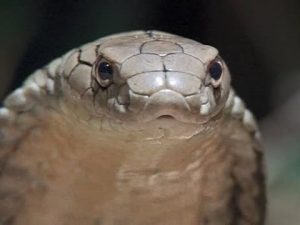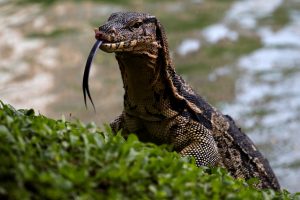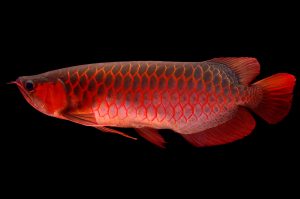LOS ANGELES
 Operation Jungle Book, a law enforcement initiative led by the U.S. Fish and Wildlife Service that targeted wildlife smuggling, has resulted in federal criminal charges against 16 defendants, according to officials.
Operation Jungle Book, a law enforcement initiative led by the U.S. Fish and Wildlife Service that targeted wildlife smuggling, has resulted in federal criminal charges against 16 defendants, according to officials.
The defendants allegedly participated in the illegal importation and/or transportation of numerous animal species – including a tiger, monitor lizards, cobras, Asian “lucky” fish, exotic songbirds and several coral species.
“We are combatting an ever-growing black market for exotic animals. An insatiable desire to own examples – both living and dead – of these vulnerable creatures is fueling this black market,” said Acting United States Attorney Sandra R. Brown. “This is a truly international problem that threatens the survival of iconic species and vulnerable animal populations. The United States Attorney’s Office is prosecuting a wide array of cases that highlight the pervasive problem of wildlife trafficking and the associated issues of invasive species, disease transmission and the extinction of certain species.”
“Wildlife trafficking does not stop at international borders, and it is our duty to protect imperiled species both at home and abroad,” said Ed Grace, Fish and Wildlife Acting Chief of Law Enforcement.
Over the past several months, prosecutors from the Environmental and Community Safety Crimes Section of the U.S. Attorney’s Office have filed and litigated a series of cases that demonstrate the scope of the underground market for protected wildlife.
The cases further illustrate the various means used by traffickers to avoid detection in the harvesting and illegal smuggling of various species, according to authorities.
The black market for protected wildlife increases the demand for wildlife and their parts, which threatens to decimate vulnerable species. The prosecution of these cases will educate the public about the laws protecting wildlife and deter future wildlife crimes.
Tiger
A Florida man was arrested yesterday afternoon on charges of being involved in the illegal sale and transportation of a Bengal tiger that was seized from a residence in Ventura County.
Nicholas Bishop, also known as “Nick the Wrangler,” 27 – who currently resides in Hollandale, Florida, but at the time of the offense lived in Henderson, Nevada – was named in a criminal complaint filed late last month that charges him with the federal felony offense of aiding and abetting the purchase of a prohibited wildlife species.
The State of California also prohibits the possession of tigers and other large cats (certain licensed individuals and organizations have exceptions).
According to the affidavit in support of the complaint, Bishop falsified documents used to purchase the tiger in March 2014 from an Indiana organization called Wildlife In Need, Wildlife Indeed.
In a statement he later gave to investigators, Bishop said that he had purchased the tiger for Michael Ray Stevenson, a rapper who uses the stage named Tyga.
The following month, the tiger was seen in a backyard in Ventura and reported to authorities, which later located and seized the animal in Piru.
The two individuals who possessed the tiger in Piru were convicted in state court.
When it was recovered, the tiger weighed approximately 100 pounds; it now weighs well over 400 pounds.
Bishop allegedly falsified purchase records and caused the interstate transport of the tiger without the necessary documentation and permits required by the Fish and Wildlife Service and the U.S. Department of Agriculture.
Bishop was taken into custody yesterday afternoon.
He is expected to make his initial court appearance this week in Fort Lauderdale, Florida. If he were to be convicted of the criminal charge, Bishop is facing up to five years in federal prison.
King cobras
 A Monterey Park man pleaded guilty last month to smuggling king cobras – reptiles that were illegally brought into the United States after being hidden in potato chip cans shipped from Hong Kong.
A Monterey Park man pleaded guilty last month to smuggling king cobras – reptiles that were illegally brought into the United States after being hidden in potato chip cans shipped from Hong Kong.
Rodrigo Franco, 34, was arrested in July and charged with smuggling the cobras that were intercepted by CBP in March, along with Chinese albino soft-shelled turtles.
At the time the cobras were seized, Franco was already under investigation because of a prior shipment of three protected turtles – two big-headed turtles and a pig-nosed turtle (or “Fly River” turtle) – that Fish and Wildlife had intercepted in January.
After the cobras were seized in March, Fish and Wildlife agents searched Franco’s residence, where they found, in a child’s bedroom, a Morelet’s crocodile, five diamond back terrapins and various turtles – all of which are protected under the Convention on International Trade in Endangered Species of Wild Fauna and Flora or CITIES, a treaty among 183 nations that is designed to ensure that international trade in specimens of wild animals and plants does not threaten their survival.
When he pleaded guilty, Franco admitted smuggling a total of 23 cobras that had a black market value of approximately $46,000. The three cobras seized by authorities in March were sent to the San Diego Zoo, where one ultimately died.
Franco pleaded guilty on September 7 and is scheduled to be sentenced by United States District Judge George H. Wu on December 7, at which time he will face up to 20 years in federal prison.
Monitor lizards

An Inglewood man pleaded guilty last month to smuggling five monitor lizards into the United States – two of which died while they were being shipped.
Gayle Simpson, 33, pleaded guilty on September 27 to one count of smuggling monitor lizards that were shipped from the Philippines.
The case against Simpson stems from a package intercepted by authorities in April.
The package, which was labeled as “speakers” and was addressed to Simpson’s son, contained five monitor lizards: three spiny-necked water monitor lizards, one Samar water monitor lizard, and one Palawan water monitor lizard.
Two of the monitor lizards arrived dead, and a third had suffered a crushed foot. All five monitor lizards are protected under CITES. A subsequent search warrant executed by Fish and Wildlife at Simpson’s residence resulted in the seizure of four yellow-headed water monitor lizards and two spiny-necked water monitor lizards.
Simpson is scheduled to be sentenced by United States District Judge Manuel L. Real on November 20, at which time he will face a statutory maximum penalty of 20 years in federal prison.
In another case involving monitor lizards, a Long Beach man is scheduled to be arraigned on November 7 after being charged earlier this month with smuggling two species that had been shipped from the Philippines.
Bryan Cho, 41, allegedly was set to receive five monitor lizards in a package that was intercepted by Fish and Wildlife October 2016. After a shipping company delivered the package, USFWS agents went to Cho’s business, where agents saw the same species of lizards in the store.
In May, Fish and Wildlife learned about another package from the Philippines that was sent to Cho’s business address in Long Beach. While the package was described as containing “Toy Cars,” Cho admitted to ordering two or three monitor lizards from the Philippines.
If he convicted of the smuggling offense, Cho would face a statutory maximum penalty of 20 years in federal prison.
Arowana fish (“lucky” fish)
 A Westminster man who sold Arowana fish – said to be the world’s most expensive aquarium fish – pleaded guilty yesterday to smuggling the protected fish thought to be symbols of luck and prosperity in parts of Asia, as well as various turtle species.
A Westminster man who sold Arowana fish – said to be the world’s most expensive aquarium fish – pleaded guilty yesterday to smuggling the protected fish thought to be symbols of luck and prosperity in parts of Asia, as well as various turtle species.
Kevin Duc Vu, 45, pleaded guilty to a felony charge that carries a maximum sentence of 20 years in federal prison.
In September 2016, officials intercepted a package addressed to Vu’s wife that contained six arowanas and seven big-headed turtles The intercepted package also contained seven four-eyed turtles, six Asian box turtles and one black-breasted turtle. Six of the turtles ultimately died as a result of the smuggling efforts.
On October 5, 2016, Fish and Wildlife agents searched Vu’s residence and recovered two black-breasted turtles and four dead arowanas that were concealed in a freezer.
Evidence uncovered during the USFWS investigation revealed that Vu had previously ordered wildlife, including arowanas, from an overseas supplier. According to court documents, Vu sold arowanas for $1,900, big-headed turtles for $850, and a pair of black-breasted turtles for $2,000.
Vu is scheduled to be sentenced by U.S. District Judge Christina A. Snyder on Feb. 5.
Arowanas are also at issue in a three-count indictment returned by a federal grand jury last month, which charges an Orange County man and a foreign national with conspiring to smuggle the protected fish into the United States.
The indictment charges Shawn Naolu Lee, 29, of Garden Grove, and Mickey Tanadi, 21, of Jakarta, Indonesia, with conspiracy, smuggling protected fish into the United States and submitting a false record for wildlife intended for importation.
According to court documents, Lee ordered eight arowanas from Tanadi, agreeing in January to pay $2,000 for the fish plus shipping costs. Tanadi put the fish into bags of water that were concealed in porcelain pots to evade detection, which he then allegedly shipped in February.
An officer noticed that a package labeled as “Porcelain Herbal Pots” was leaking water, and officials intercepted the shipment. Following a controlled delivery of the shipment to Lee’s residence, USFWS agents recovered the arowanas..
However, all eight fish ultimately died as a result of the smuggling scheme.
Lee has plead not guilty to the charges in the indictment, and is scheduled to go on trial before U.S. District Judge Otis Wright II on November 14. Tanadi remains at large.
If they are convicted of the three charges in the indictment, Lee and Tanadi would each face up to 30 years in prison.
A Florida man was charged earlier this month with a misdemeanor offense of engaging in the unlawful trade of arowana fish. Cory Pham, 43, of Sunrise, Florida, was named in a criminal complaint that alleges he brought five arowanas on a flight from Vietnam to Los Angeles International Airport on October 5.
Pham allegedly concealed the fish in black bags that were hidden in a plastic container placed in his luggage. Pham did not declare the arowanas to customs officials, nor did he have any permits that would allow him to legally bring the fish into the United States.
Pham is scheduled to be arraigned in this case on November 14. If he was convicted, Pham would face a maximum sentence of one year in federal prison.
Asian songbirds
An Orange County man was ordered this week to serve one year in federal prison, and another six months in home detention, after pleading guilty to smuggling protected Asian songbirds into the United States.
Kurtis Law, 50, of Fountain Valley, was sentenced by United States District Judge Manuel L. Real after pleading guilty last summer to smuggling and attempted entry of goods by means of false statements.
Law was arrested in May after bringing 93 Asian songbirds, worth nearly $100,000, on a flight from Vietnam. All but eight of the birds died in transit or soon after arriving at Los Angeles International Airport.
Earlier this week, a Westminster man pleaded guilty to conspiring to smuggle Asian songbirds – specifically, Chinese Hwamei – into the United States.
Sonny Dong, 55, admitted hiring another man to illegally import the birds from Vietnam. The birds were smuggled by hiding them under clothes or in baggage on airline flights.
Dong pleaded guilty before United States District Judge S. James Otero, who scheduled a sentencing hearing for May 14, 2018. Dong faces a statutory maximum sentence of five years in federal prison.
Feathers from protected birds
A Santa Ana man is scheduled to go on trial December 12 on misdemeanor charges of illegally selling feathers on Facebook from protected migratory birds and bald eagles.
Tyler Rene Vela, 27, could be sentenced to up to one year in prison if he is convicted of selling feathers from a bald eagle and up to six months in prison if convicted of selling feathers from a red-tailed hawk and a turkey vulture.
Corals
Late last month, prosecutors obtained three indictments charging a total of three individuals and two companies with engaging in the unlawful trading of protected live corals.
Arraignments for all of the defendants are scheduled for early November.

